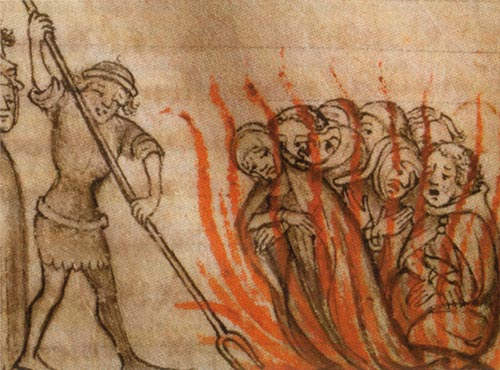
Are you by any chance one of the tens of millions of people who suffer from paraskevidekatriaphobia? That’s the technical term for someone who’s truly spooked by Friday the 13th, the only date – at least for those of us who are part of Western civilisation – that has a major superstition associated with it. Though said superstition has faded a good deal in recent years, for many it still has the power to evoke a little frisson (and then of course there’s the infamous, dozen-film horror franchise stretching from 1980 to 2009).
Many people just get a bit nervous on such a date, but others can have panick attacks or get obsessive – some refusing to travel, conduct major business, or even get out of bed; lost business and productivity today are a documented phenomenon.
This fear and the belief in curses and bad luck associated with this inauspicious particular date (which occurs once to three times a year) seems to have entered mass consciousness after the 1907 publication in New York City of a novel, Friday, the Thirteenth, dealing with stock-market shenanigans. But it was based on a notion of this unlucky date documented back to the 19th century, and with some glimmerings as far back as the Middle Ages.

And like many aspects of folk belief, its actual origins are even murkier, with various possible explanations floating around. Separately, Friday and the number 13 have over the centuries become associated with ill luck for various reasons: There were 13 apostles at the New Testament‘s Last Supper, and Friday was supposedly the day Jesus Christ was crucified, as well as the day Eve gave Adam the apple and the great flood of Noah’s Ark fame started (how they figured those two out, who knows!). In ancient Egypt, the last step on the ladder of life was the 13th. In Norse mythology, the 13th guest at a banquet of the gods caused untold havoc and tragedy.
Specific events, too, have been suggested – one particularly notable one being the traumatic mass arrests and slaughter of Catholic Knights Templar order members (above, being burned at the stake) by order of France’s King Philip on Friday, October 13, 1307.
Personally, I suspect all this to-do has a lot to do with selective interpretation and memory, as well as the ingrained human tendency throughout history to seek out patterns and meaning where none necessarily exist
Paraskevidekatriaphobiacs, does any of that help at all? You’ll get another chance in several more month to find out – Friday, October 13, to be exact!
Stay safe…

